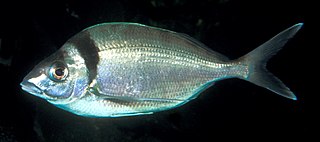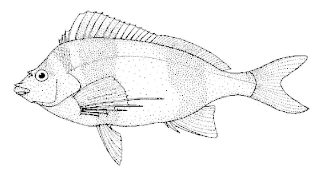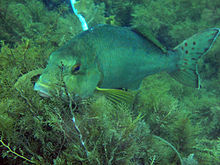
Cheilodactylidae, commonly called morwongs but also known as butterfish, fingerfins, jackassfish, sea carp, snappers, and moki, is a family of marine ray-finned fish. They are found in subtropical oceans in the Southern Hemisphere. The common name "morwong" is also used as a name for several unrelated fish found in Australian waters, such as the painted sweetlips. The classification of the species within the Cheilodactylidae and the related Latridae is unclear.

The red moki also known as the banded morwong, brown-banded morwong, carp or nanua is a species of marine ray-finned fish, traditionally regarded as belonging to the family Cheilodactylidae, commonly referred to as morwongs. It is found off southern Australia and the North Island of New Zealand

The porae, the grey morwong, blue morwong, butterfish, Douglas' morwong, Eastern blue morwong, great perch, queen snapper, rubberlip morwong or silver morwong, is a species of marine ray-finned fish, traditionally regarded as belonging to the family Cheilodactylidae, the members of which are commonly known as morwongs. found around south eastern Australia and the north eastern coast of the North Island of New Zealand at depths of about 10 to 100 metres, on sandy and rocky coasts.

Nemadactylus macropterus, the tarakihi, jackass morwong or deep sea perch, is a species of marine ray-finned fish, traditionally regarded as belonging to the family Cheilodactylidae, the members of which are commonly known as morwongs. It is found in the south western Pacific Ocean, in Australia and New Zealand. Although there are records from the southern Indian Ocean and southwestern Atlantic, these may be due to misidentifications of similar species.

Latridae commonly called trumpeters, is a family of marine ray-finned fish. They are found in temperate seas in the Southern Hemisphere. The classification of the species within the Latridae and the related Cheilodactylidae is unclear.They are fished commercially and for sport.

The redfingers is a species of marine ray-finned fish, belonging to the family Cheilodactylidae, commonly referred to as morwongs. It is found only off the coasts of Namibia and South Africa, in rock pools and from shallow depths to 120 m, on rocky reef areas. Its length is up to 30 cm.

The magpie perch, magpie morwong or black-striped morwong, is a species of marine ray-finned fish, traditionally regarded as belonging to the family Cheilodactylidae, the members of which are commonly known as morwongs. It is found off southern Australia and northern New Zealand from shallow depths to 250 m (820 ft).

The barred fingerfin is a species of marine ray-finned fish, belonging to the family Cheilodactylidae, commonly referred to as morwongs. It is found only in the southeastern Atlantic and southwestern Indian Oceans off the coasts of South Africa.

The red morwong, also known as the sea carp, is a species of marine ray finned fish traditionally regarded as belonging to the family Cheilodactylidae, the members of which are commonly known as morwongs. It is found off southeast Australia and the North Island of New Zealand from shallow depths to at least 55 m, on rocky reef and coastal areas. Its length is between 30 and 60 cm.

The painted moki, also known as the painted morwong, is a species of marine ray-finned fish, traditionally regarded as belonging to the family Cheilodactylidae, the members of which are commonly known as morwongs. It is found in the southwestern Pacific Ocean.

St. Paul's fingerfin, is a species of marine ray-finned fish, traditionally regarded as belonging to the family Cheilodactylidae, the members of which are commonly known as morwongs. It is native to the southwestern Indian Ocean and southeastern Atlantic Ocean.

Cheilodactylus is a genus of marine ray-finned fishes belonging to the family Cheilodactylidae, known as morwongs, although this name is not unique to this family. They are found in the temperate waters of the southern hemisphere and in the North Pacific Ocean.

Chirodactylus is a genus of marine ray-finned fish, traditionally regarded as belonging to the family Cheilodactylidae, the members of which are commonly known as morwongs.They are native to the Atlantic, Indian and eastern Pacific oceans off southern Africa and South America.

Nemadactylus is a genus of marine ray-finned fish, traditionally regarded as belonging to the family Cheilodactylidae, the members of which are commonly known as morwongs. They are found in the South Atlantic, Indian and South Pacific Oceans.

Latris is a genus of marine ray finned fish belonging to the family Latridae, the trumpeters. They are found in the southern oceans.

Goniistius is a subgenus of marine ray-finned fishes, traditionally classified as being within the genus Cheilodactylus and belonging to the family Cheilodactylidae, known as morwongs, although this name is not unique to this family and the true taxonomic placement of this taxon requires clarification. They are found in the Pacific Ocean and southeastern Indian Ocean.

Morwong is a subgenus of marine ray-finned fish traditionally classified within the genus Cheilodactylus and as belonging to the family Cheilodactylidae found in oceans off Australia and New Zealand. They were formerly included in the genus Cheilodactylus in family Cheilodactylidae, but based on genetic and morphological analyses they have strongly suggested that the genus Morwong is a valid genus and should be placed in the family Latridae.

Chirodactylus variegatus, the Peruvian morwong or bilagai, is a species of marine ray-finned fish traditionally regarded as belonging to the family Cheilodactylidae, the members of which are commonly known as morwongs. It is found in the southeastern Pacific Ocean off the western coast of South America.

The spottedtail morwong is a species of marine ray-finned fish, traditionally regarded as belonging to the family Cheilodactylidae, the members of which are commonly known as morwongs. It is found in the northwest Pacific Ocean.

Nemadactylus valenciennesi, is a species of marine ray-finned fish, traditionally regarded as belonging to the family Cheilodactylidae, the members of which are commonly known as morwongs. It is endemic to southern Australia.















